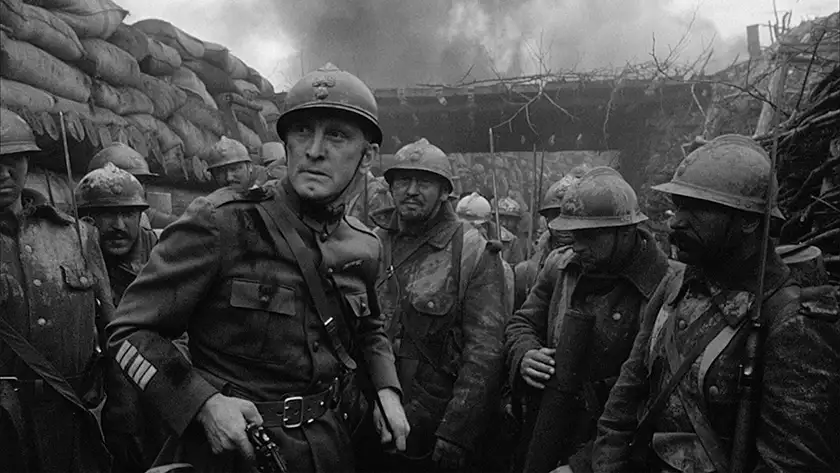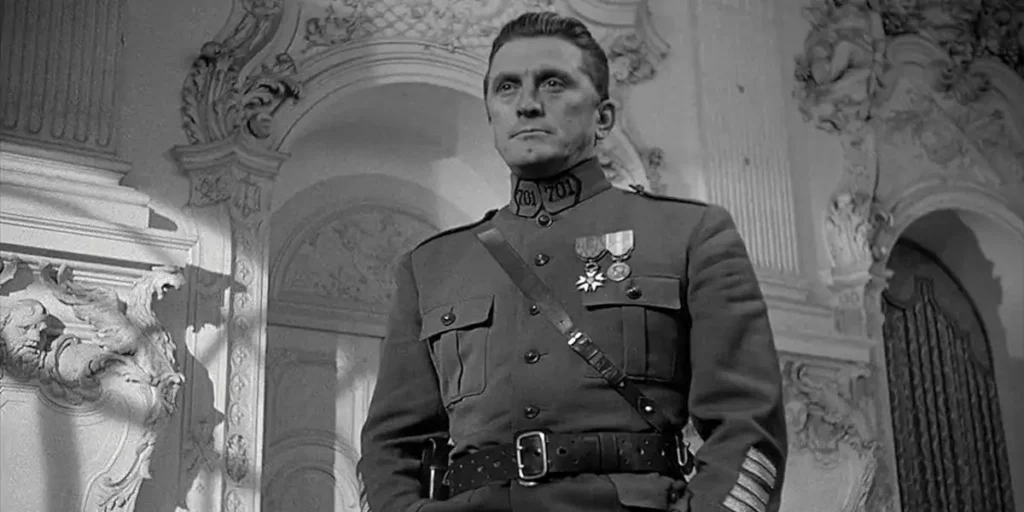Stanley Kubrick’s Paths of Glory is a war film that is inherently anti-war. It is poignant and infuriating in equal measure, and all the better for it.
Stanley Kubrick’s Paths of Glory is, perhaps, one of the finest anti-war war films ever made. It’s a gutting, stark exploration of incompetence, manipulation and bureaucratic nonsense in the name of ‘success’. The price of said success? Those forced to serve underneath a self-serving leadership group and regarded as mere fodder for personal achievement. But perhaps the most gutting thing of all, is that this isn’t an irrelevant message, even almost seventy years after the film’s initial release.
It’s 1916, and the French Army is deep in trench warfare against the Germans. General Mireau (George Macready) is tasked with securing an important vantage point just beyond No Man’s Land, a mission that is almost certainly doomed to failure. But his personal ambitions – buoyed by the hint of another medal for his collection from the deceptively agreeable General Broulard (Adolphe Menjou) – outweigh any concern one might assume he has for the men in his charge, and he bullishly orders Colonel Dax (Kirk Douglas) to complete the task.
Things go, as expected, disastrously. To save face, Mireau orders three soldiers to be chosen at random and tried for cowardice as punishment. Dax, an intelligent, compassionate man and former criminal lawyer, offers to defend the three unlucky scapegoats – Corporal Paris (Ralph Meeker), Private Arnaud (Joe Turkel) and Private Ferol (Timothy Carey) – at their Court Martial hearing, knowing it may well be an exercise in futility.
Paths of Glory is infuriatingly sad by design, with Kubrick understanding the power of watching helplessly in the face of injustices. The film is a commentary on the insidious nature of war, the machinations of those in power and the lack of compassion as a result. Its opening narration proverbially drops the mic with the phrase: “successful attacks were measured in hundreds of yards, and paid for in lives by hundreds of thousands”. A pointed summation of this stage in WWI, it’s an assessment evidenced by the film Kubrick presents, and one still horrifyingly relevant in an age where innocent lives are still being wasted in the name of sovereignty, borders and the idea of ownership and ego.
The film itself is sharp, pointed and relatively restrained for Kubrick. It’s only battle scene is a cacophony of noise, explosions and fallen bodies, but the film isn’t aiming to be showy. It is much more focused on insidious bureaucracy and injustices, particularly those faced by the ordinary men at the heart of the fighting in the name of those at the top, who in turn are too preoccupied with their own interests.

Douglas is fantastic as Dax, the soldier – but, perhaps more importantly, the man – caught in the middle. He is the audience’s conduit to compassion in such a fraught situation. Dax himself isn’t immune to manipulation, but instead of glory, his dangling carrot is the threat of being removed from command. He cannot face the idea of his men being left at the mercy of someone with an ideological view like that of Macready’s Mireau, and so he executes the suicidally stupid mission. But the point is that he does so with an understanding of its true nature, leading in the way he believes to be right and not in the way shown to him.
The General himself enters the trenches with a banal smile, ignoring the wounded being carried past him and asking the same benign questions to every soldier he meets. He refers to 29 casualties as “utterly inexcusable”, but in the manner of being annoyed rather than horrified. Macready’s is another excellent performance in a film full of them, made all the more terrifying by the understanding that this isn’t some hissable pantomime villain, but rather the kind of man often entrusted with military power, and one who is often rewarded for it.
But Paths of Glory isn’t interested in being an echo chamber for pats on the back. Nor is it interested in why bureaucracy is the way it is. Instead, it’s a film that looks to show the utterly incomprehensible facets of war and the heartbreaking price paid by those who are forced to fight it.
Kubrick’s film faced backlash upon its initial release – particularly in France, where it wasn’t screened for almost two decades – but its realism is what is so poignantly effective. Yes, it offers little consideration for authentic language or accent, but that feels like an unnecessary and pedantic argument. The point here is the plot and the anti-war point Kubrick is making, and it is purposefully appalling in a manner that surely transcends any dialogue quibbles.
Paths of Glory, in 2024, is a film that still cuts to the quick. It is gruelling poignant and exquisitely crafted, a testament to Kubrick’s talent as a filmmaker. It’s a war film that is inherently anti-war, and perhaps as important a watch today as it was in 1957.
Paths of Glory is now available to watch on digital and on demand.

